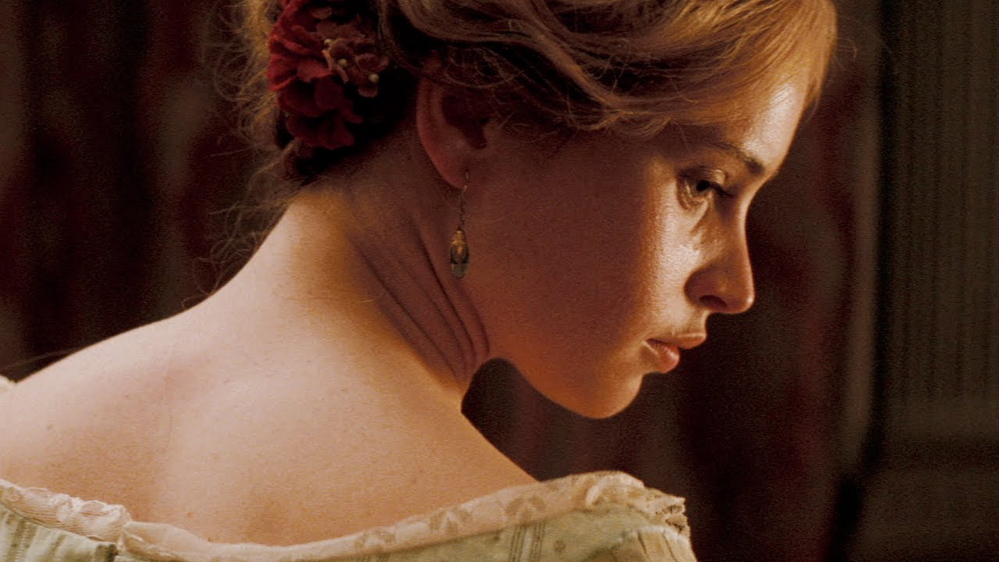“I know I am but summer to your heart, and not the full four seasons of the year.”
â Edna St. Vincent Millay
In Ralph Fiennes’ poignant “The Invisible Woman,” we learn much more about the great Charles Dickens than we need to. Fiennes gives us a Dickens who was a wonderful actor, speaker writer, and in addition, a self-centered egotistical raconteur and cad. All of this from the book by Claire Tomalin and Abi Morgan’s very good screenplay.
It is from the view point of an l8-year-old actress, Nelly, (a gifted and lovely Felicity Jones) that we see the other face of the man who was one of the greatest writers of stories in history and the biggest jerk.
Fiennes’ Dickens is a man who desperately and successfully seeks fame and admiration. Charles Dickens was the Beatles of his time, all wrapped up in a towering, swaggering ball of fire and ego. We learn here, not the Dickens of the printed page, but about the man, his dark secrets, emotional fragility and desperate passion to be a star.
We begin on a long stretch of deserted autumn English beach, where we see a woman in black walking into the wind. It is years after Dicken’s death, and this is Nelly.
She is now 47 (still looking 18) and a teacher at a Christian school and the wife of the headmaster, a young, serious and sensitive man, George Wharton Robinson (Tom Burke).
Then we’re back in 1857 with Charles Dickens, famous and prolific husband and father of 10 children. One evening Charles encounters a family of theatrical women who tour the English stage, comprised of the mother (Kristin Scott Thomas) and three daughters, the youngest of whom is l8-year-old Nelly, and it is she who stuns the much older writer and draws him into a web of May December love. Bit by bit, touch by touch, and finally sheet by sheet, they become “an item.”
Of course, his wife Catherine Dickens (an amazing Joanna Scanlan) is a heavy set, proper Victorian, who none the less is the wisest of the lot. Like most wives, she is no dummy, but unprepared to go it alone, she has long ago made the deal.
We get another look at the plight of women in the Victorian age that is not pretty, when Nelly’s mother, knowing that a life upon the wicked stage won’t make a star of Nelly, closes her eyes to the inchoate scandal. A life as a concubine with her own house and servants seems to be the best possible long care insurance for her.
Fiennes’ Dickens is a kind, gentle and generous man, but one of enormous, almost childlike appetites both for success and its wealth, and the sweet taste of youth. Why he does not just divorce his wife is left a mystery. And so he sweeps his child mistress into the shadowy recesses of an elaborate palatial closet; where he can hide her very pregnant beauty from the press.
But with great fame comes great focus. The paparazzi of the day sweep down on the illicit lovers like Hitchcock’s birds. Dickens is finally forced to defend his choices in the press, a move that can only further humiliate his wife and cast even deeper shadows over what’s left of his affaire de coeur.
The final card is played when traveling together to France and returning to England, their train is involved in a terrible derailing accident. Nelly is hurt but not seriously. Dickens is forced not only to leave her in the care of strangers, but to suggest, for proprieties’ sake, that he does not even know her. Unbelievably, the affair goes on until his death, but thankfully, we are spared the pain of watching Nelly’s and Mrs. Dickens’s lifelong humiliation.
Fiennes is always a pro and delightful to watch. Felicity Jones is both lovely and talented. Kristin Scott Thomas has this kind of role down pat, and attention must be paid to the startling performance of Joanna Marion Scanlan as Dicken’s humiliated wife. Her breakdown scene and the expression on her face as Dickens has her boarded up into a section of the house, is amazing.
Rob Hardy’s camera and Nick Dent and Sarah Stuart’s art direction finish the hat. A note of caution: Feminists of all ages should check their blood pressure at small intervals.
J.P. Devine is a former stage and screen actor.
Send questions/comments to the editors.


